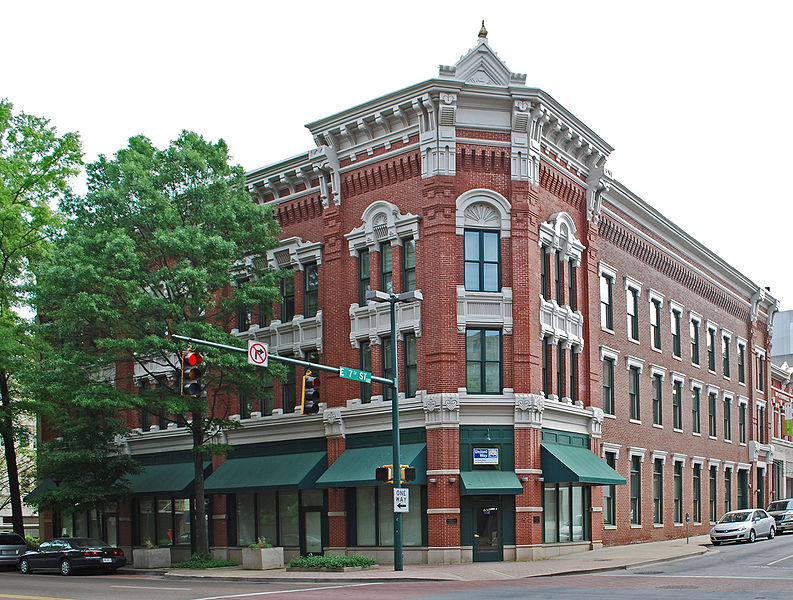Marx Block, MD, 1832-1908
By Emma Florio, Special Collections Library Assistant
 |
|
Portrait of Block from the Chattanooga Daily Times, July 12, 1891.
|
Marx Block was born in 1832 into a Jewish family in Alsace, a region in eastern France with a large and historic Jewish population. He received his early education in France before emigrating to the United States in 1857. He first settled in New York City, where he worked as a clerk in a wholesale business, and then in 1859 he moved to Chicago where he taught French. Three years later he entered the medical department of Lind University, the initial incarnation of Feinberg School of Medicine, which became Chicago Medical College in 1863 while Block was still a student. He earned his MD in 1865 as part of CMC’s 5th graduating class, likely making him the first Jewish graduate of the medical school.
Shortly after receiving his MD, Block, like many recent medical school graduates at the time, enlisted in the military. He was mustered into service as an assistant surgeon in the 14th United States Colored Infantry Regiment on August 24, 1865, three months after the end of the Civil War, when the United States Army was stationed in Southern states to administer the new policy of Reconstruction. He was mustered out, along with the rest of his regiment, at Greenville, Tennessee, in March 1866.
After finishing his military service, Block married Delphine Lazard, a Jewish woman also from the Alsace-Lorraine region of France, and began his medical practice in Chattanooga, Tennessee. Within a few years, though, poor health caused him to stop actively practicing medicine and he focused his career on pharmacy. In 1868 he went into partnership with his brother-in-law Prosper Lazard and formed the firm M. Block & Co., which sold pharmaceuticals retail and wholesale. By 1872 the company had become so successful that Block was traveling into northern Alabama and Georgia to spread their wholesale business. The company developed its own proprietary remedies including “Bee Hive Cough Syrup” and Concordia wine, made from grapes grown by Block on his farm outside of Chattanooga, and was so successful two traveling salesmen were hired to grow the business.
Lazard withdrew from the business in 1887 and Block assumed entire ownership of M. Block Drug Company, which he ran until his death. He also formed the Block & Drackett wholesale drug company in 1890 with Philip William Drackett, a chemist and pharmacologist from Cleveland. Block’s success led to prominent positions such as president of the Chattanooga Druggist Association and vice president of the East Tennessee Pharmacy Association. He was also an early member of the faculty of the Chattanooga College of Pharmacy, which opened in 1892 and eventually became part of the University of Tennessee.
 |
|
Central Block Building, financed by Block and built in 1883, via Wikipedia
|
Block was involved in the wider Chattanooga community as well. Both Block and his wife Delphine played important roles in the early years of city’s Jewish community, which had its origins in the 1860s. The Blocks were members of one of the oldest synagogues in the city, the Mizpah Congregation, where Marx acted as lay rabbi for the congregation from 1871 to 1878, and again from 1892 to 1896. Delphine was also a founding organizer of the city’s Hebrew Ladies Aid Society, a charitable organization. In addition to this work, Block was active with the Chattanooga Board of Education and the Chamber of Commerce. As a member of the Chamber of Commerce he returned to Chicago in 1892 as part of a delegation aiming to strengthen commercial ties with what was then the Northwest of the country.
Marx Block died in Chattanooga in 1908, at the age of 76. His legacy lives on in the city through the many buildings that he financed, including the Central Block Building, which still stands in downtown Chattanooga. The year after his death, a memorial window was dedicated to him at the Mizpah Congregation, honoring his place in the Chattanooga Jewish community.
Selected References
Clark, Alexandra Walker. Hidden History of Chattanooga. The History Press: Charleston, SC, 2013.
History of East Tennessee. Nashville: Goodspeed Publishing Co., 1887. Via the Hamilton County Tennessee Genealogy Society.
Updated: August 9, 2023